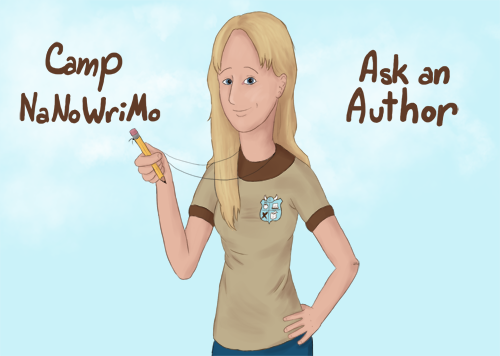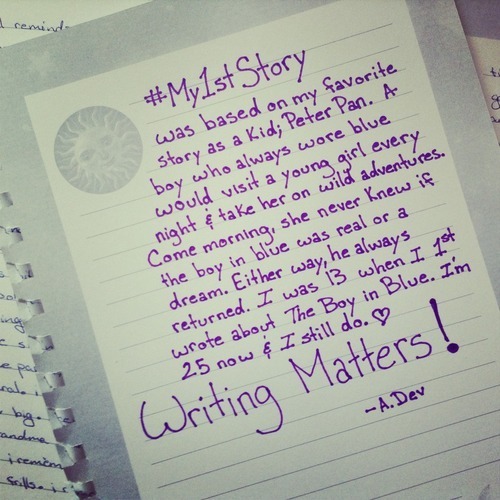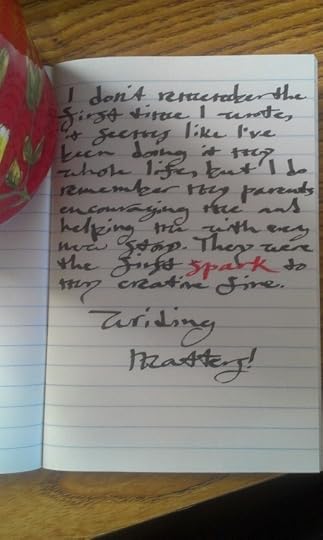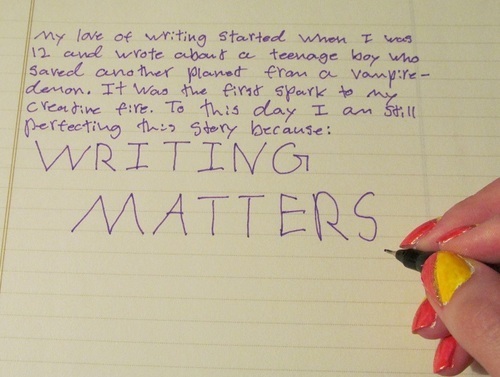Chris Baty's Blog, page 211
June 28, 2013
Ask a Published Author: "How do you balance novel-writing with real life?"

How do you balance novel-writing and real life, and how difficult of a process can that be? — Dream3r
It can be very difficult to balance writing, a day-job, and loved ones. You have to make a lot of choices and prioritize. You might have to try several things before you figure out what works for you. I’ve found that, for me, it really comes down to time management and focus.
It’s knowing that I only have one hour to write today and I have a deadline, so I need to write as much as I can even if I don’t feel like it.
It’s putting down the computer for five minutes, even though I have a deadline, to pay attention to my family or friends when they need me.
It’s knowing what I’m willing to let go when I’m busy.
It’s knowing how to say no so you’re not stretched too thin.
It’s so easy as an author to feel like you have to do everything. I’m learning how to focus on the things I like to do instead of doing everything. I make a lot of lists and prioritize. But again, that’s what works for me.
Suzanne Lazear is the author of the steampunk fairytale series The Aether Chronicles. Innocent Darkness is out now. The sequel, Charmed Vengeance , will be released on August 8, by Flux.
Next week Jennifer Bosworth, author of the YA novel Struck, will take up the Head Counselor whistle and answer your questions! Ask her about first-week jitters, writing YA, and more here!
June 27, 2013
"Get Out of Your Routine": How to Make Space for Writing In Your Life

During NaNoWriMo’s “In Your Pocket” Summer Drive, we’ll be posting “ My First NaNo ” stories from you, our amazing participants, and the writing tips you learned from your maiden voyage. Today, board member Tony Shen shares how he overcame his late start to finish his novel by busting his routine:
It must have been November 12 or later. The start date for National Novel Writing Month had come and gone; I’d decided I didn’t have it in me to write a book in a month. This was the fourth November that I had considered writing only to do nothing about it. But my life was still fine. I sat down in a cafe two blocks from my house and happily opened a book by some amazing writer who was not me.
I noticed a friend intently working on his laptop. I got up and talked to him. He mentioned something about his daily word count and being behind, of course. We talked about the holidays then I returned to my table. Then I stood up, walked back to my house, grabbed my computer, returned to the cafe, and began my NaNo-novel. I had no idea what to write about, so I just started writing.
NaNoWriMo ended up giving me so much. I had played guitar for 10 years and had lamented that I could never write even one song. I wrote and recorded five songs in the two months after winning NaNoWriMo.
My tip for finishing your novel is to get out of your routine. If you normally come home right after work, don’t. Go to a cafe and write even though you may be tired and hungry. Routine-busting is a method to achieving your goal of writing a novel in one month.

Tony Shen is the Chief Operating Officer for EdTec, a social venture supporting charter schools throughout the US. He holds an MBA from UC Berkeley’s Haas School of Business and a BA from Stanford University. But really, Tony would rather be turning his 2011 NaNoWriMo novel into a rock opera co-starring Carrie Brownstein and Radiohead.
Photo by Flickr user madame.furie.
June 26, 2013
Ask a Published Author: "How do you decide what to write?"

How do you decide what to write when your head is full of multiple plotlines? — Anonymous
I write the characters that shout the loudest. Just kidding. Well, sort of.
Sometimes, when I’m having a lot of trouble with a story I will start writing things down to see where it’s actually going, figuring out what works and what doesn’t, and sorting out the plotlines that work from the plotlines I want to work. Sometimes I may write—or just think through in my head—alternate plotlines or POVs to see what is most compelling and works best for the story.
Sometimes you do have to scrap things and start over. It’s hard work, but I’ve found that it’s worth it if it makes the story stronger.
Suzanne Lazear is the author of the steampunk fairytale series The Aether Chronicles. Innocent Darkness is out now. The sequel, Charmed Vengeance , will be released on August 8, by Flux.
Next week Jennifer Bosworth, author of the YA novel Struck, will take up the Head Counselor whistle and answer your questions! Ask her about first-week jitters, writing YA, and more here!
June 24, 2013
"You Will Surprise Yourself": How Setting Writing Goals Can Expand Your Abilities

During NaNoWriMo’s “In Your Pocket” Summer Drive, we’ll be posting “ My First NaNo ” stories from you, our amazing participants, and the writing tips you learned from your maiden voyage. Today, participant Rebecca Leach shares how committing to her word-count goal showed her she was capable of even more than she’d thought:
My first National Novel Writing Month was in 2004: I was a senior in high school, filling out college applications and fighting desperately against senioritis. But I loved writing and really wanted to give NaNoWriMo a try.
So I did. In November, I wrote. I wrote and wrote and wrote. I shocked myself, the weekend before Thanksgiving, when I realized—I was almost at 50,000! I’d been so lost in the story that I stopped noticing my word count until I was at about 47,000 words.
When I did notice, I said, “Oh. That’s only three thousand more words. I could finish that in a couple of hours. OMG, I’M GOING TO FINISH RIGHT NOW.” And I did. I finished the same day, and for a little while (like, maybe five minutes), I sat back and enjoyed being finished.
But then I got antsy. There were days left in November. I couldn’t just stop writing. I jokingly thought, ‘Wouldn’t it be funny if I made it to 100,000 words?’ There was a brief pause in my brain.
I tried to tell myself I was crazy, but I wouldn’t listen. I kept writing. I’m not sure how I managed to pass all my classes, because I was writing all the time. On the last day of NaNoWriMo, I still had 5,000 words to go before making my new goal. I convinced my dad to let me stay up late and write on his computer.
With minutes left until midnight, I crossed the 100,000-word mark and validated my final word count. I’d done it. I’d met this crazy, insane goal I set for myself. And I didn’t fail out of high school!
I’ve participated in NaNoWriMo every year since 2004, but the first year is the one that taught me the most, about succeeding at NaNoWriMo and about being a writer in general. My tips?
Write something you’re super excited about, even if it’s embarrassing or you think it’ll never sell or it’s a genre you’ve never tried before. If you love what you’re writing, the words will come.
Go to write-ins, or organize a meet-up! Even if you’re super shy and awkward and have so little driving experience that you can’t park your dad’s giant SUV and have to run into your very first write-in to ask a bunch of total strangers to safely do it for you—um, not that I have experience with that—you should totally go to write-ins, or start a group.
Other Wrimos are some of the most welcoming, enthusiastic people ever. Even if you’d rather not talk to anyone quite yet, you can still sit and write while surrounded by people who have the same crazy deadline and goal as you. Just being near other writers can provide a huge boost in motivation.
No matter how insane you think you are for trying this, do it anyway. No matter how crazy your life is or how busy your schedule is or how certain you are that there’s no way you can possibly make it to 50,000, try anyway! Because you never know how far you’ll get. You will very likely surprise yourself.
Rebecca Leach is an information designer and copyeditor from Austin, Texas. She received her master’s in writing from the New School University and is a 2013 Lambda Literary Foundation Fellow. She writes whenever she can—in the morning, in the car, during lunch, and between turns at flying trapeze classes. Currently, she’s working on three speculative YA novels, which are in varying stages of completion.
Photo by Flickr user artnoose.
June 21, 2013
ajadev:
My 1st story was written as a long poem. I illustrated...

My 1st story was written as a long poem. I illustrated it with my own drawings of the Eiffel Tower and Taj Mahal. These were all places the nameless Boy in Blue took the young girl. It was for a class project. My 8th grade teacher liked it so much she kept it when I moved on to high school. In my sophomore year of college, during winter break I visited my 8th grade teacher & she returned to me my 1st story. Back on campus after the break I changed my major from Environmental Science to Creative Writing. My advisor said, “I feel that was your plan all along. I’m glad you’re done fighting it.”
Writing matters.
"Use Self-Imposed Constraints to Write": How to Challenge Your Noveling

“The more constraints one imposes, the more one frees oneself of the chains that shackle the spirit… the arbitrariness of the constraint only serves to obtain precision of execution.”
— Igor Stravinsky
It may seem counterintuitive but for someone like me who suffers from choice paralysis and noveling ADD, applying constraints to my writing is often the only way to get from A to Z without losing my momentum and/or my mind. The freedom from choice is what helps me focus my creative energy in a more productive way!
My first NaNoWriMo was in 2006, a couple months after I was hired as the NaNoWriMo Managing Editor. At that same time, I discovered (and became obsessed with) Oulipo, which “is a loose gathering of (mainly) French-speaking writers and mathematicians which seeks to create works using constrained writing techniques.”
Before this discovery, most of my writing was surreal short form and was nearly always based on my dreams. Dreams are a great constraint, but my dream-life was inconsistent; there was no way to guarantee that I’d have enough inspiring dreams in November to get me through a 50,000-word novel.
This is where Oulipo and its constrained writing techniques came in to save my first NaNo. Though I did not follow any of the well-known constraints, I became inspired to come up with my own and to plan my novel accordingly.
I chose to write a novel using the following three constraints:
All characters would be inanimate objects.
Each chapter would take place on a different planet (starting with Pluto, which had just been demoted as a planet).
Each chapter would begin with and would be based on a random quote found on Wikipedia (using the randomize tool until I found a quote that was interesting to me).
It worked! I wrote 50,000 words in 30 days and stayed sane while simultaneously working for NaNoWriMo during the era when Chris Baty and I were the only full-time employees. To this day, I use various self-imposed constraints to write: dreams, geographic locations, and found objects included.
I’d love to know if anyone else out there in NaNoLand uses self-imposed constraints (or even traditional Oulipo constraints) to write their novels and what they are?
— Tavia
Photo by Flickr user amanda farah.
June 20, 2013
holywaterandsonicscrewdrivers:
Every piece of writing I’ve done...

holywaterandsonicscrewdrivers:
Every piece of writing I’ve done so far has contributed to me as a person and a writer, and I wouldn’t trade those little picture books for a thing.
Writing matters.
My first story was a picture book about a princess. I’m pretty sure that was also every story I wrote until I was twelve. They’ve all made me the writer and the person I am today.
Writing matters.
waywardmirkwoodknight:
I remember in third grade when I sat on the swing set and read The Hobbit....

I remember in third grade when I sat on the swing set and read The Hobbit. I wanted Gandalf to knock on my door and take me on a fantastic adventure. So I made it happen with my pens and notebooks. I still haven’t given up hope, and I haven’t stopped writing. It was the first spark to my creative fire.
Writing Matters
ageoldphrases:
I don’t remember the first time I wrote, it...

I don’t remember the first time I wrote, it seems like I’ve been doing it my whole life, but I do remember my parents encouraging me and helping me with every new story. They were the first spark to my creative fire.
Writing matters!
you-write-your-own:
My love of writing started when I was 12...

My love of writing started when I was 12 and wrote about a teenage boy who saved another planet from a vampire-demon. It was the first spark to my creative fire. To this day I am still perfecting this story because WRITING MATTERS!
Chris Baty's Blog
- Chris Baty's profile
- 63 followers




